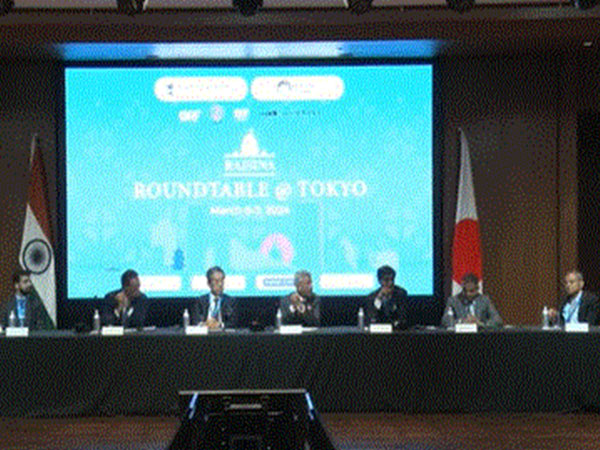
“Raisina Roundtable represents special strategic partnership between Japan, India”: Japanese Foreign Minister

Tokyo [Japan], March 16 (ANI): Japan Foreign Affairs Minister Yoko Kamikawa emphasised that ‘The Raisina Roundtable’ represented the special strategic partnership between Japan and India, stressing that both nations are key partners.
Thought leaders and practitioners from India and Japan, and like-minded partners and the other Quad countries participated in the inaugural edition of the ‘Raisina Roundtable’ held in Japan earlier this month.
Kamikawa emphasised that India is the ideal partner for Japan to collaborate and work on identifying solutions to the problems of a rising Global South.
The Observer Research Foundation, in partnership with ORF America, the Japan Bank for International Cooperation and Keizai Doyukai, hosted the inaugural Raisina Roundtable in Tokyo on March 6 and 7. The Roundtable was supported by Unison Capital, Nippon Steel, Suntory Ltd, and Google.
The Roundtable underscored the strategic importance of the Quad in the Indo-Pacific region and served as a pivotal platform to build consensus on critical issues, forge new partnerships, and enhance economic ties.
Noting the ongoing crises in the world, Japan’s foreign minister Kamikawa said, “The world is at a crossroad. The Russia-Ukraine conflict is radically shaking the international order. The situation in the Middle East is worsening. Furthermore, climate change, food and energy crises are hitting the globe. In addition, we have to cope with AI and live with misinformation. In this context, Japan aspires to lead the international community towards collaboration and seek new solutions, not more confrontation.”
Emphasised the ties between India and Japan, she said, “In today’s world, India and Japan are key partners.”
She added that this relationship is important across three main sectors. First, India, as a unique democracy, must serve as the key to tacking a divisive world; second, India provides stability, and prosperity, and acts as a public good. To maintain a free and open Indo-Pacific, India and Japan hold a grave responsibility in the region; and last, India is the ideal partner for Japan to collaborate and work on identifying solutions to the problems of a rising Global South.
Speaking at the event, External Affairs Minister S Jaishankar said that it is important that Japan today appreciates the pace of change in India.
“This is a country which is building 28 kilometres of highway every day; which is creating eight new airports every year; which is establishing 1.5 to 2 metros every year. Which has for the last two years built 2 new colleges every day, and which has doubled its technical and medical institutions and output,” he stated.
This transformation of India makes us a more effective and credible partner,” EAM emphasised.
Highlighting that India is a very different country today, Jaishankar said, “Whether it is the ease of doing business,” Jaishankar continued, “business infrastructure development, ease of living, digital delivery, a start-up and innovation culture, or shaping the international agenda, India is clearly a very different country today.”
“This is important for the Japanese to recognize,” he added.
Japanese Prime Minister Fumio Kishida, in a video message, commended India’s growth and said, “Growth attained by countries referred to as the Global South has been outstanding – with India playing a core role among such countries, attracting attention across dimensions.”
Last year, as the respective holders of the G7 and G20 Presidencies, Japan and India responded to global challenges in close partnership.
He further appreciated Prime Minister Narendra Modi and EAM Jaishankar for their strong leadership that brought great success to the G20.
The then-Japanese Prime Minister Shinzo Abe laid out the vision of a “Free and Open Indo-Pacific” in a speech to the Indian Parliament in 2007.
Former Japanese PM Abe envisioned an Indo-Pacific that is based on shared values, economic collaboration, maritime security, and the establishment of a rule-based order.
His vision has been widely discussed and supported by various nations in the region and beyond.
In an effort to take his vision forward, the conversations at the Raisina Roundtable in Tokyo focused on three thematic pillars, namely, Geopolitics & Geo-economics; A New Development Architecture; and Achieving Green Transitions.
Former Japanese PM Yoshihide Suga, while addressing the Raisina Roundtable, said that the international community must unite to uphold a rules-based international order.
Emphasising that one of their key partners is India, he said, “The Japanese government is collaborating with like-minded countries like the US, Australia, and India. We are trying to make diplomatic efforts for the realization of a Free and Open Indo-Pacific. We are continuously making diplomatic efforts.”
Japan’s Minister of Economy, Trade and Industry, Ken Saito stressed, “We are at a major historical turning point. Against this backdrop, we need to pave the way for a new era. More than ever, we need reliable partners like India.”
He added that this relationship is only going to be more important going forward.
“For example, we need resilient supply chains. We also need to reinforce economic security and realise sustainable growth. We need to coordinate with our allies in order to identify solutions to these very difficult challenges,” Saito said.
Additionally, co-chairs of the conference, Tadashi Maeda of Japan Bank for International Cooperation, and Takeshi Niinami of Keizai Doyukai and Suntory Ltd. also spoke on several occasions at the Roundtable and reiterated their commitment to the India-Japan partnership and the need to enhance geoeconomics ties between the two countries.
Furthermore, at the Raisina Roundtable, Google officially launched the Cybersecurity Center of Excellence in their Roppongi office, inaugurated by Kono Taro, Minister of Digital Transformation, Japan. (ANI)

















POST COMMENTS (0)